Today Australian Foreign Minister Julie Bishop observed that the Mosul offensive is an 'important milestone' in the battle against Islamic State; there is no doubt retaking the city would seriously dent both IS capabilities and morale. But it would not be a fatal blow.
The Iraqi Army and its allies have two years of planning behind them since those fateful four days in June 2014, when IS overran Iraqi security forces and pillaged US military equipment in a lightning surge on Mosul that saw the Iraqi Army down arms and flee. Now Iraqi-led forces are leading the battle to take back what has become the regional IS capital.
Intelligence reports suggest many of the IS command have already left Mosul and slipped across the border into Syria (a border they destroyed two years ago) well ahead of the offensive. There, they are likely to remain unmolested for now. The fear is that from the relative safety of its Syrian capital of Raqqa, IS will be able to regroup and frustrate efforts to restore order in Mosul down the track. It is essential that once the Iraqi Army and its allies secure Mosul, they work to restore governance and regain the cooperation of the local civilian population by restoring infrastructure and functionality, and addressing the urgent humanitarian needs of the population.
A failure to restore such order and trust (and it's far from clear there is a workable plan to do so) raises the spectre of Shiite militia-led reprisals against the Sunni host population in Mosul (it’s happened before) that could sow the seed for the same kind of dissatisfaction that gave rise to IS in Iraq two years ago. Perhaps even more concerning for the West, there is every chance a depleted IS may shift its attention to exporting terrorism attacks abroad from its safe base in Raqqa.
For both these reasons, it’s imperative that a carefully planned Raqqa campaign closely follows the Mosul offensive.
However, there is no denying the geopolitical and ethnic constraints in Syria make Raqqa a much more difficult prospect.
The Mosul offensive has been driven by the regional Kurdish Peshmerga, backed by regular Iraqi Army, as well as irregular, Iranian-trained Shiite militias, and US commandos. But in Syria, the US lacks partners on the ground. Until now, the half-hearted US strategy in Raqqa has been to isolate and degrade IS through targeted airstrikes by US and allied forces, and provide loose cover to Kurdish ground troops allied with the Kurdish Democratic Union party PYD (which Turkey considers to be Syrian offshoot of the Kurdistan Workers’ party).
It's unlikely (in fact, probably impossible) that the Mosul line-up would work in Raqqa, mainly due to Turkish opposition to their Kurdish foes controlling the border city.
Any involvement from Iranian-backed Shiite militias is also out of the question. The risk of reprisals against the majority Sunni population, the likes of which we have already seen in Tikrit, is high. The prospect of any lasting peace settlement in the city, where the population is still wholly opposed to Assad and his Iranian backers, at the hands of a Shiite-dominant force is nil.
The best case scenario is that a mainly Arab, mainly Syrian moderate opposition force will lead that inevitable campaign to victory in Raqqa, thereby avoiding a vacuum that could be exploited by Islamists in the future. This kind of acceptable moderate Sunni opposition force has remained elusive throughout the entire Syrian conflict. Nevertheless, there was an injection of optimism earlier last week when Turkish-backed FSA successfully managed to regain control from the IS stronghold, and prophesised site of the 'final battle', Dabiq.
While Turkey has been talking up a joint effort with the US against IS in Raqqa, for now it seems the US and its allies in Iraq are in no rush to think beyond the outcome in Mosul. But Raqqa is going nowhere and we ignore it at our peril.
Photo by Carl Court/Getty Images

